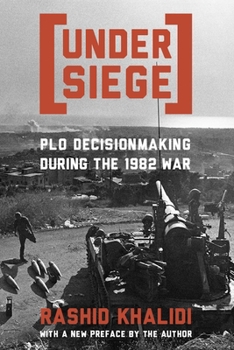Under Siege: P.L.O. Decisionmaking During the 1982 War
Select Format
Select Condition 
Book Overview
Under Siege is Rashid Khalidi's firsthand account of the 1982 Lebanon War and the complex negotiations for the evacuation of the P.L.O. from Beirut. Utilizing unconventional sources and interviews with key officials and diplomats, Khalidi paints a detailed portrait of the siege and ensuing massacres, providing insight into the military pressure experienced by the P.L.O., the war's impact on Palestinian and Lebanese civilians, and diplomatic efforts by the United States. A new preface by Khalidi considers developments across the Middle East in the thirty years since the conflict. The preface also cites recently declassified Israeli documents to offer surprising new revelations about the roles and responsibilities of both Israeli leaders and American diplomats in the tragic coda to the war, the Sabra and Shatila massacres.
Format:Paperback
Language:English
ISBN:0231166699
ISBN13:9780231166690
Release Date:January 2014
Publisher:Columbia University Press
Length:256 Pages
Weight:0.85 lbs.
Dimensions:0.7" x 6.0" x 8.9"
Grade Range:Postsecondary and higher
Customer Reviews
1 rating
An Insider's Account
Published by Thriftbooks.com User , 19 years ago
When examining the 1982 war in Lebanon, there are many different aspects that one can study. Books have been written explaining Israeli motives for the invasion, analyzing the international reaction, studying American intervention, and debating the war's impact on Lebanese society. In writing Under Siege, Rashid Khalidi attempts to fill a gap in the scholarship by focusing on the P.L.O. Khalidi's personal experience and sympathies are a part of his narrative - he lived in Beirut during the summer of 1982 as a witness to the siege. In describing the situation of the P.L.O., Khalidi utilizes and contributes to a narrative that juxtaposes victim and aggressor, and his sympathies clearly lie first with the Palestinian people and second with their sometimes misled liberation organization. In his preface, he dedicates his book to those who gave their lives in "defense of the cause of Palestine and the independence of Lebanon." The Israeli invasion and the siege of Beirut were a high-water mark of the Israeli-Palestinian conflict, and was a military, political, and diplomatic showdown between Israel and the P.L.O. In the introduction to his work, published in 1986, Rashid Khalidi states that "few Lebanese or Palestinians have had the chance to record their view of events in 1982." These views, and Khalidi's, reject the narrative that Israel invaded, surrounded, and forced the P.L.O. to flee Lebanon in something approximating a Palestinian surrender. "It is wrong to assume that... Israel's defeat of their forces... [meant] that the P.L.O. was summarily forced to leave, with the only question ever at issue being when and how." A large part of his work is devoted to showing the P.L.O. as an actor in the events, rather than a group that was acted upon. Khalidi begins his work with an overview of the P.L.O.'s experience in Lebanon in an attempt to show the change in Lebanese opinion towards the guerrillas and their leadership. Initially, the P.L.O. participated in the Lebanese civil war, fighting alongside the Lebanese National Front (L.N.F.). The L.N.F. consisted of various leftist militias composed of Sunni Muslim lower classes, factions of the Shia Amal militia and led by the charismatic Druse chief Walid Jumblatt. The P.L.O. and the L.N.F. created a command called the Joint Forces (J.F.) against the rightist Lebanese Forces (L.F.) Khalidi suggests that the P.L.O.'s growing strength and its sense of entitlement ultimately led to the isolation of the Palestinian leadership in Lebanon. The guerrillas, who had previously fought alongside the L.N.F. against the rightist militias and the Syrian army, found themselves without allies on the eve of the invasion. This isolation at the beginning of the war was only exacerbated by the punishment the Lebanese suffered under the Israeli assault. Lebanese opposition under siege meant that the P.L.O. could draw on no domestic support against the Israeli position. In describing the terrific difficulties of confront






